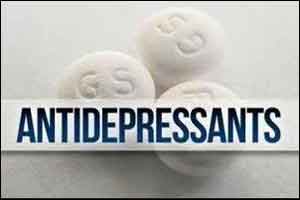- Home
- Editorial
- News
- Practice Guidelines
- Anesthesiology Guidelines
- Cancer Guidelines
- Cardiac Sciences Guidelines
- Critical Care Guidelines
- Dentistry Guidelines
- Dermatology Guidelines
- Diabetes and Endo Guidelines
- Diagnostics Guidelines
- ENT Guidelines
- Featured Practice Guidelines
- Gastroenterology Guidelines
- Geriatrics Guidelines
- Medicine Guidelines
- Nephrology Guidelines
- Neurosciences Guidelines
- Obs and Gynae Guidelines
- Ophthalmology Guidelines
- Orthopaedics Guidelines
- Paediatrics Guidelines
- Psychiatry Guidelines
- Pulmonology Guidelines
- Radiology Guidelines
- Surgery Guidelines
- Urology Guidelines
Lancet study finds sertraline better at lowering anxiety than reducing depression

UK: One of the most commonly used antidepressant sertraline may lower anxiety more effectively than reducing the symptoms of depression, a recent study published in The Lancet has found.
Depression is a major contributor to the disease burden globally and by 2030 is predicted to be the leading cause of disability in high-income countries. Depression patients are usually managed in primary care and SSRI antidepressants are often the first-line treatment. But most antidepressant trials are of patients from secondary care mental health services with eligibility criteria based on diagnosis and severity of depressive symptoms. As a result, the antidepressants are used in a much wider group of people than in the previous regulatory trials.
Gemma Lewis, University College London, London, UK, and colleagues investigated the clinical effectiveness of sertraline in patients in primary care with mild to severe depressive symptoms and tested the role of duration and severity in treatment response.
"We hope that we have cast new light on how antidepressants work, as they may be primarily affecting anxiety symptoms such as nervousness, worry and tension, and taking longer to affect depressive symptoms," Lewis said in a press release.
The PANDA study included 653 people in England aged between 18 and 74 who underwent surgery from a general practitioner. About half of the patients were prescribed daily 50 milligram capsules of sertraline for one week, then two daily capsules for up to 11 weeks. The other group was prescribed placebos on the same schedule.
The patients' reported depressive symptoms that ranged from mild to moderate over the previous two years.
Also Read: Postpartum depression: Novel treatment yields positive results in phase 3 trial
Key findings include:
- About 54 percent of the patients were diagnosed as depressed, while 46 percent suffered anxiety.
- 15 percent were diagnosed for both conditions categories and another 15 percent were not diagnosed but still experienced symptoms.
- The researchers found no evidence that sertraline led to a clinically meaningful reduction in depressive symptoms at 6 weeks.
- The mean 6-week PHQ-9 score was 7·98 (SD 5·63) in the sertraline group and 8·76 (5·86) in the placebo group.
- For secondary outcomes, sertraline led to reduced anxiety symptoms, better mental (but not physical) health-related quality of life, and self-reported improvements in mental health.
- There was weak evidence that depressive symptoms were reduced by sertraline at 12 weeks.
- Seven adverse events were recorded—four for sertraline and three for placebo, and adverse events did not differ by treatment allocation.
- Three adverse events were classified as serious—two in the sertraline group and one in the placebo group.
- One serious adverse event in the sertraline group was classified as possibly related to study medication.
Also Read: Study finds women at greater risk of depression, anxiety after hysterectomy
"Antidepressants can be beneficial to people with depression or anxiety but any benefit has to be set against any side effects or the possibility of withdrawal symptoms," Gemma said.
To read the complete study follow the link: https://doi.org/10.1016/S2215-0366(19)30366-9

Disclaimer: This site is primarily intended for healthcare professionals. Any content/information on this website does not replace the advice of medical and/or health professionals and should not be construed as medical/diagnostic advice/endorsement or prescription. Use of this site is subject to our terms of use, privacy policy, advertisement policy. © 2020 Minerva Medical Treatment Pvt Ltd